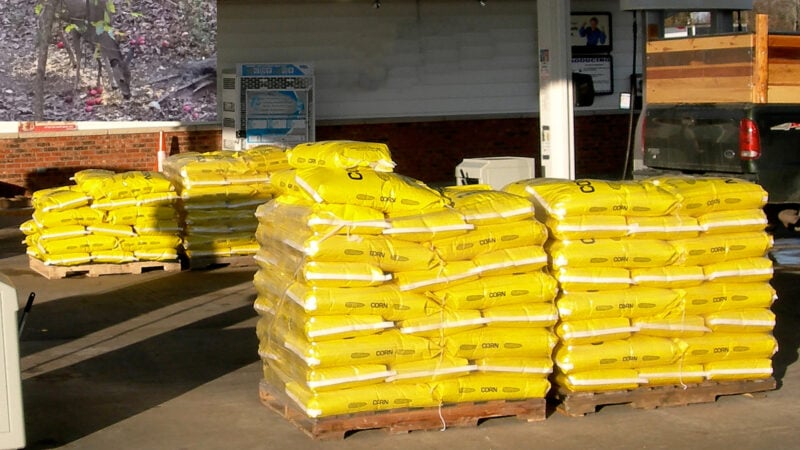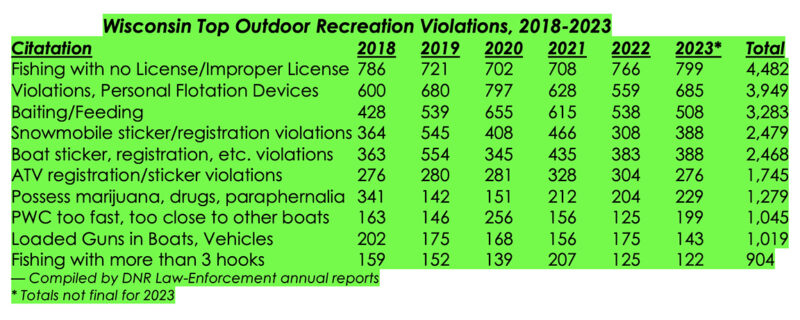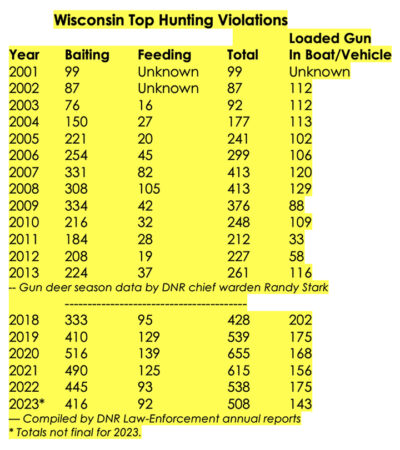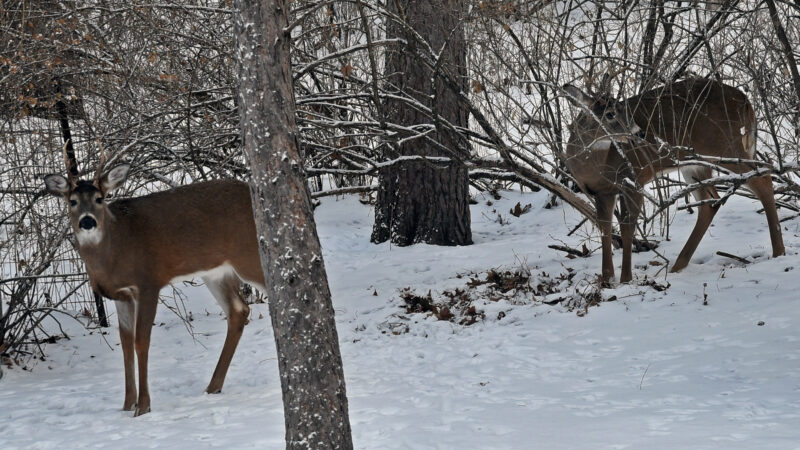Wisconsin’s deer-baiting violators have consistently disregarded the state’s baiting and feeding laws since the state found chronic wasting disease in its herd in February 2002.
Whether Wisconsin forbade deer baiting in 33% of its 72 counties in the years soon after CWD’s discovery, or in 82% of its counties in 2023, deer baiters have led the state in hunting-related citations each fall.
Baiting is currently legal in only 14 of Wisconsin’s 72 counties during the state’s rifle, archery, crossbow and muzzleloading deer seasons: Douglas, Bayfield, Ashland, Iron, Burnett, Price, St. Croix, Pierce, Clark, Brown, Door, Kewaunee, Manitowoc and Ozaukee.

Even so, baiting violations remained the top hunting violation the past six years. A review of citations issued by the Wisconsin Department of Natural Resources from 2018 through 2023 showed baiting/feeding generated 3,283 citations those years, No. 1 in hunting-related violations and No. 3 overall in outdoor recreation, with 2023 data still coming in.
In fact, baiters and, to a lesser extent, recreational deer feeders, combined for three times more citations than hunting’s No. 2 violation: putting loaded guns on or into a boat, car, truck or other motorized vehicle.
And it’s not as if baiting violations carry cheap penalties. About 95% of baiting citations bring a $343.50 fine, according to Matt O’Brien, the Wisconsin DNR’s deputy chief warden. Violators who exceed baiting’s 2-gallon maximum by 25 gallons or more risk fines over $745. The fines for getting caught with loaded weapons in or on your vehicle or boat is $258 for a gun and $232 for a crossbow.
Wisconsin game wardens wrote over 600 types of citations the past six years. Of the 10 most common citations issued, only two involved hunting. While baiting/feeding ranked third overall, violations involving loaded firearms on or inside boats and motor vehicles ranked ninth with 1,019 citations. Citations involving loaded crossbows on boats and vehicles totaled 289 those years.
Those findings basically align with reports compiled each December in the 2000s by former Wisconsin chief warden Randy Stark when recapping the nine-day November gun-deer season. DNR wardens issued only 87 baiting citations in 2002 after the agency banned baiting statewide in the wake of CWD’s discovery. Baiting citations fell to 76 in 2003 when uncertainty surrounded the Legislature’s newly imposed 2-gallon limit. Only the most egregious violations drew citations that year.
Baiting citations then fluctuated during gun season from 150 to 334 cases through 2013, when Stark retired. The DNR discontinued Stark’s detailed reports on gun-season violations. During the past six years, DNR data show baiting violations ranged from 333 in 2018 to 516 in 2020.

Which violation is No. 1 in Wisconsin outdoor recreation? The agency’s detailed annual citation records from 2018 through 2023 showed fishing without a license topped the list the past six years, totaling 4,482 citations, nearly 750 annually.
That’s probably not surprising, given that many folks are casual anglers. They might fish only once a year, and figure their odds of getting caught are minuscule. Others maybe felt hurried that day and skipped buying it, or forgot their license expired March 31.
Boaters can be forgetful, too; even complacent. Wisconsin’s data show boaters often disregard laws on personal flotation devices, such as carrying enough PFDs for everyone on their boat, or having a throwable PFD in boats 16 feet or longer. PFD violations rank No. 2 in Wisconsin outdoor recreation, accounting for 3,949 citations, nearly 660 annually.
Complacency and forgetfulness also play roles in three other common violations, all involving registration requirements for boats, ATVs/UTVs, and snowmobiles.
— No. 4: Violations of snowmobile registration rules and registration stickers; 2,479 citations, nearly 415 annually.
— No. 5: Violations of boat registration rules and registration stickers or hull ID numbers; 2,468 citations; about 410 annually.
— No. 6: Violations of ATV/UTV registration rules and registration stickers, 1,745 citations; about 290 annually.
In contrast, it’s hard to bait deer through oversight or complacency. When game wardens show up at a treestand and find a bait pile nearby, the hunter they encounter knows how it got there. After all, buying, hauling, pouring and monitoring bait doesn’t happen by accident, especially among hunters who watch their bait 24-7 with trail-cameras.

Other top Wisconsin DNR violations requiring intent rank lower on the list.
— No. 7: Possessing marijuana, illegal drugs and/or drug paraphernalia; 1,279 citations, nearly 215 annually.
— No. 8: Operating personal watercraft too fast or too close to other boats; 1,045 citations, nearly 175 annually.
— No. 10: Fishing with more than three hooks, 904 citations, about 150 annually.

But none of those other top violations require the same effort and planning common to baiting/feeding. Perhaps the only charitable excuse is that Wisconsin hunters must pay attention to the state’s fluctuating roster of counties that forbid baiting. When a wild deer or privately owned game-farm deer tests positive for CWD in a county with no previous cases, baiting is immediately banned. Likewise, if a county’s border is within 10 miles of the new CWD case, baiting is outlawed there, too.
To complicate matters, the Wisconsin Legislature passed a bill in 2017 that lifts a county’s baiting ban if the DNR finds no more CWD cases for three years. The ban expires in neighboring counties if no new cases appear within two years.
That law, however, doesn’t require the DNR to conduct annual scientifically designed sampling before lifting the ban. CWD testing is voluntary statewide. In fact, the bill’s author, former Rep. Adam Jarchow, R-Balsam Lake, still publicly encourages hunters not to get their deer tested for fear they could trigger baiting bans.
Wisconsin game wardens, of course, won’t publicly criticize laws that complicate their work. They do, however, give hunters some grace when the law is triggered or relaxed.
Dylan Belisle, a Wisconsin warden who patrols Rusk and Barron counties, said Rusk County was always open to baiting until a deer near Birchwood in Washburn County tested positive for CWD in October 2023. In contrast, Barron County has been a revolving door, opening and closing repeatedly because of the Jarchow law.
Belisle said most hunters want to be law-abiding, whether they like a law or not. Still, it’s a learning curve as baiting laws fluctuate in his area, and he considers that uncertainty when encountering hunters in the field.
“Hunters understand, and most of those who were baiting know they have to learn to hunt without it,” Belisle said. “Others see someone on social media using a gravity feeder, but don’t realize it’s illegal here. And just like any other rule, some hunters know the law quite well, they disagree with it, and they continue baiting no matter what.”

 By
By 



